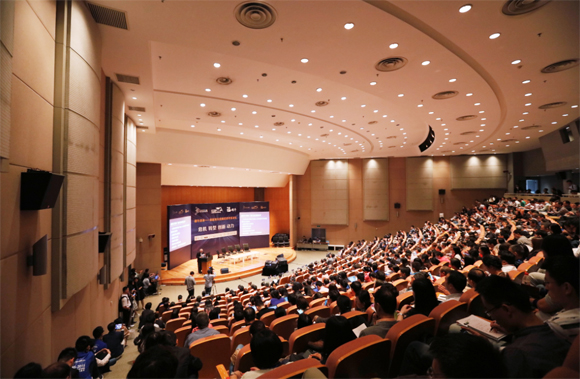China’s economy remains vital amid restructuring, scholars say

Scholars gather at Fudan University to discuss issues pertaining to China’s economic development.
China’s economy is undergoing an enduring and profound restructuring, and new driving forces are needed to promote transformation, said scholars at the first Fudan Chief Economists Forum, held in Shanghai on Oct. 10. They added that the key issue is to make progress in reforms, which could be driven by innovation or increased efficiency. Based on this analysis, they argued that China’s economy is still promising.
With a focus on challenges, transformation, innovation and momentum, participants exchanged their views on the hot economic issues China currently faces.
“The history of world economy is in essence the history of the relationship between the government and the market,” said Xia Bin, a consultant to the State Council and chairman of China Chief Economist Forum, adding that the critical problem is to recognize and handle this relationship. With regard to China’s economic development, it is crucial for authorities to balance the policies of reform and restructuring with stable growth.
From a global perspective, Asia is a major contributor to world economic growth, while China is the most important economy in this region, said Wei Shangjin, the chief economist of the Asian Development Bank and a professor of finance and economics at Columbia University, noting that China accounts for 34 percent of world GDP growth.
Compared to the US, Japan and the European Union, China’s economy is still growing faster, in a phase of medium-to-high growth, attributed to two reasons. One is the huge potential of China’s economy. The other is the accumulation that occurred in over 30 years since the reform and opening up. Xia argued that enduring and profound restructuring would inevitably bring about a decline in growth, but it also means that the emphasis of growth will shift from quantity to quality.
Liu Shijin, former vice-minister of the Development Research Center of the State Council, agreed that a decrease in the growth rate is not a cause for concern. The crux is to improve quality and realize sustainable and effective growth, he said. Fostering new engines of growth requires changes in the growth pattern and increases in efficiency, which are also crucial for sustainable development.
The environment and operation of the economy in the country now are more complicated relative to countries with mature market economies. There are two ways to implement economic structural adjustment, Xia said. One is compulsory adjustment, which is to say to passively acclimatize to economic circles while being restrained by market rules. The other is to act in compliance with the logic of the market, supplemented by proper government intervention. China needs to give greater consideration to coordinating and balancing different areas during the reform process. Therefore, the government must learn how to strengthen expectation management in the market.
Wei said China’s economic growth is affected by two structural factors. One is demographics. If the working population shrinks by 0.3 percent, there will be a corresponding 0.18 percent decline in GDP growth. The second is the rising cost of domestic labor, which is prompting the formerly competitive labor-intensive industries to move to countries with lower labor costs.
Xia argued that, generally speaking, although the problem of excess production capacity is severe throughout the country, each region should implement different policies that are tailored to local conditions. Guiding low-end manufacturing to the middle and western regions while avoiding redundant construction will be conducive to economic stability.
Nevertheless, there are other obstacles to economic restructuring. Liu pointed out that in the past, developmental economics and economic growth theories concentrated on economic takeoff, while there was a lack of studies on sustainable development after the initial stage. This will be an area in which Chinese economists can make breakthroughs, he said.
Referring to new terms and concepts that have recently emerged in economics, Xia showed his concerns, “When judging current situations, economists should pay attention to the words they use. They should try to use accurate ones that are comprehensible to ordinary people instead of pursuing novel ones that can easily create ambiguity.”
Li Yu is a reporter at the Chinese Social Sciences Today.
